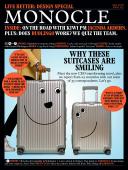
Issue 113
Design special. Inside: on the road with Kiwi prime minister Jacinda Ardern. Plus, does Duolingo work? We quiz the team.
In This Issue
Oops! No content was found.
Looks like we no longer have content for the page you're on. Perhaps try a search?
Return Home

